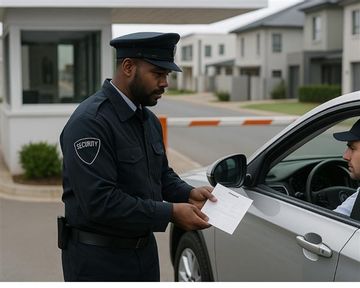Understanding the Role and Importance of Real Estate Agents in South Africa
Whether you're buying your first home, selling an investment property, or looking to rent, chances are you’ve dealt with a real estate agent at some point. But how do you know if you're working with someone who is properly qualified, compliant with regulations, and genuinely acting in your best interests?
To gain clarity on this often-misunderstood profession, we spoke with Susan Kruger from Compliance Realtor, who shared her expertise on what consumers need to know about working with real estate agents in South Africa. What emerged is a comprehensive picture of the qualifications, responsibilities, and red flags to watch out for - information every buyer, seller, landlord, or tenant should understand.
What exactly does a real estate agent do?
Real estate agents are more than just facilitators of property transactions. A qualified, registered agent is accredited by the Property Practitioners Regulatory Authority (PPRA) and holds a valid Fidelity Fund Certificate (FFC). This certificate is not just a piece of paper, it is proof that the agent is legally authorised to operate and bound by the ethical standards set by the regulatory body.
Their responsibilities include more than hosting show days or listing homes online. Agents are tasked with overseeing all aspects of a transaction, whether that’s sales or rentals. They coordinate marketing, legal paperwork, valuations, inspections, and tenant vetting, and often act as the liaison between various professionals such as attorneys, bond originators, and contractors.
As Susan puts it, if your agent does not have a valid FFC, they are operating illegally. That means they are not only unregulated, but also cannot legally claim commission, even if the transaction goes through.
How to verify an agent’s credentials
One of the most important steps in protecting yourself is verifying that your agent is registered with the PPRA and holds a current FFC. While many agents will present their certificate upon request, Susan advises consumers to take an extra step and contact the PPRA directly for verification.
Although the PPRA website does list registered agents, Susan notes that the database can be unreliable or outdated. A direct phone call to the PPRA is more effective and ensures peace of mind.
What qualifications are required to be a real estate agent?
The real estate industry has evolved significantly over the years, and so have its qualification requirements. All registered agents must complete a specific learning path depending on when they started their careers.
For those who received their FFC before 30 June 2024, the required qualification is the FETC Real Estate NQF Level 4 (Qualification ID 59097). Agents who begin after 1 July 2024 must complete the newer QCTO Occupational Certificate NQF4 (Qualification ID 118714).
Once an agent begins practicing, they are required to undergo a 12-month internship under the guidance of a qualified principal or full-status agent. During this time, they complete workplace learning, compile a portfolio of evidence, and eventually sit for the EISA (External Integrated Summative Assessment) and PDE4 (Professional Designation Examination).
For those who wish to become principal agents—meaning they manage or own an estate agency—they must obtain an NQF5 qualification and pass the PDE5 exam. These extensive educational and experiential requirements ensure that real estate professionals are knowledgeable, compliant, and accountable.
Why work with a registered agent?
There are several key benefits to working with a properly registered and qualified real estate agent.
Firstly, registered agents are bound by a code of conduct enforced by the PPRA. This means they must operate with transparency, professionalism, and accountability. Should anything go wrong during the course of a transaction, the PPRA offers a formal complaints process, and consumers are protected by the Fidelity Fund, which can compensate clients who suffer losses due to an agent's dishonesty or negligence.
Additionally, a well-trained agent brings industry expertise, market knowledge, and negotiation skills to the table. Their experience often results in better outcomes—whether that means achieving a higher selling price, finding reliable tenants faster, or avoiding costly legal errors.
Working with a registered agent also ensures that the financial aspects of the transaction are handled according to legal requirements. For example, deposit funds must be placed in audited trust accounts, a practice that is not guaranteed when dealing with unregistered individuals.
What should sellers expect from their agent?
If you're planning to sell your property, choosing the right agent can make a significant difference in both the experience and the final sale price.
Susan recommends that sellers take the time to meet with multiple agents before signing a sole mandate. During these meetings, ask each agent about their marketing strategy, their track record with similar properties, and how they arrive at a suggested asking price.
A competent agent should provide a comparative market analysis and be able to explain how your property will be positioned relative to others currently on the market. It’s also reasonable to expect regular updates on buyer interest, feedback from viewings, and suggestions on how to improve the property’s appeal.
Clarity and communication are key. Sellers should feel empowered to ask questions and set expectations early on, including response times, availability for showings, and commission structures.
Red flags: when to be cautious
Not all agents are equally skilled or committed. There are some common warning signs that may indicate an agent is not the right fit:
- Lack of enthusiasm or engagement during discussions
- Poor or generic marketing of your property
- Infrequent communication or vague answers to questions
- Agreement to unrealistically high pricing to win the mandate
- Evasiveness about qualifications or registration status
A good agent will be upfront about their status, even if they are still completing their internship. Transparency and honesty build trust, and clients should not settle for less.
Understanding commission: what are you paying for?
One of the most common misconceptions in the property world is that there is a “standard” commission rate. According to Susan, this is simply not true.
Commission is entirely negotiable and should be agreed upon between the agent and the client before a mandate is signed. In South Africa, traditional commission rates have hovered around 7.5% (plus VAT), but this can vary significantly. Some agents charge as little as 1%, while others may go up to 8% for sales or 15% for full-service rentals and property management.
The important thing to remember is that commission should be evaluated alongside the value the agent brings. A lower commission does not necessarily equate to a better deal if the agent lacks experience or negotiating skills. In many cases, a more expensive but highly capable agent may achieve a better net result for the client.
Key considerations for landlords and tenants
For landlords, engaging a professional agent is particularly important. A qualified agent ensures that tenant vetting, lease agreements, inspections, and deposit handling are done properly and legally.
Agents use industry-standard processes to screen tenants—including credit checks, employment verification, and affordability assessments—reducing the risk of late payments or defaults.
Tenants also benefit from working with a professional agent. They are assured of a fair lease agreement, a legally compliant deposit process, and a point of contact for resolving any disputes or maintenance concerns.
Susan strongly advises tenants never to pay deposits or rental fees to an agent who cannot produce proof of a trust account or registration. This is one of the most common ways tenants fall victim to rental scams.
Scams and how to avoid them
Unfortunately, the property sector is not immune to fraud. Susan highlights several types of scams currently affecting the industry:
- Email hacking and phishing: Criminals intercept legitimate transactions and send false banking details. Always confirm account details directly with the agent before transferring money.
- Fake buyers or tenants: Fraudsters impersonate legitimate parties and request confidential information or advance payments.
- Cloned rental ads: Scammers copy listings from legitimate agencies and post them elsewhere, asking unsuspecting tenants to pay deposits upfront.
The best protection is vigilance. Always verify the identity and registration of the agent, never pay money before viewing the property, and double-check all banking details with the source.
The legal framework and oversight
Real estate agents in South Africa are governed by the Property Practitioners Act, 2019, and regulated by the PPRA. This legal framework is designed to protect the public by ensuring that agents meet strict qualification, ethical, and operational standards.
The PPRA also oversees compliance and provides mechanisms for lodging complaints, investigating misconduct, and compensating victims when necessary.
Final thoughts from Susan Kruger
Choosing the right real estate agent is not just a box-ticking exercise. It is a decision that can significantly influence the outcome of your property transaction.
Susan encourages consumers to ask questions, do their due diligence, and never feel pressured into working with someone they don’t trust.
“Working with a professional real estate agent isn’t just a nice-to-have—it’s a must. The right agent will save you time, money, and plenty of headaches,” she says.
Whether you are buying, selling, or renting, take the time to find an agent who is qualified, experienced, and committed to protecting your interests.
Need help verifying an agent or checking their FFC status? Visit the PPRA website or contact their offices directly to confirm whether your agent is registered and compliant.
More Legal articles
Speed Cameras, Courier Fines and Your HOA: What the Law Says Inside South Africa’s Security Estates
17 Nov 2025
The debate around estate fines has resurfaced after Midstream Estate in Midrand’s residents raised concerns over newly installed speed-enforcement cameras and penalties of up to R4,000 — even when the speeding driver was a courier delivering a parcel.
read more

